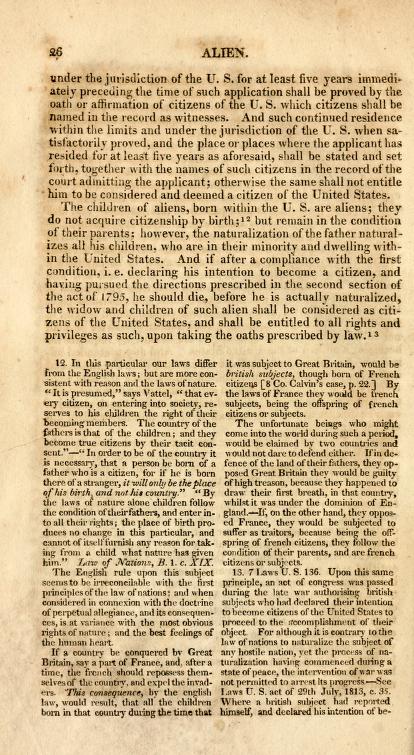Oh come on, the holding is that ‘[t]he child born of alien parents in the United States is held to be a citizen thereof, and to be subject to duties with regard to this country which do not attach to the father.’ You can’t separate that holding from the basis of it. And in fact, there is no distinction made in the text between dicta and holding, such as in modern cases, where it separates the two by the literal word, “Held.” In fact, the dissent explicitly describes the definition as “held” by the majority (”Thus, the fourteenth amendment is held to be merely declaratory, except that it ... puts that rule beyond the control of the legislative power.”)
The dissent acknowledges the common-law definition, but merely argues that common law isn’t necessarily in effect after the passage of the Constitution, a position held by no conservative on the Court, nor to my knowledge on any appellate court, arguing “if that amendment bears the construction now put upon it, it imposed the English common-law rule on this country for the first time, and made it ‘absolute and unbending,’ just as Great Britain was being relieved from its inconveniences.” In fact, it’s the DISSENT that argues that “natural-born citizen” may be defined by statue! “Nationality is essentially a political idea, and belongs to the sphere of public law.”
In fact, the dissent shows explicitly where Vattel’s definition is in direct conflict with the 14th amendment altogether: “I say that, in order to be of the country, it is necessary that a person be born of a father who is a citizen; for, if he is born there of a foreigner, it will be only the place of his birth, and not his country.”
That’s right: if we were to adhere to Vattel’s political theory, we would find that the 14th amendment directly overturns the Constitution’s definition of “natural-born.” To be clear, the dissent wouldn’t; the dissent argues that obligations to one’s country of birth should be set by legislation. I’m using Vattel herein to make a different point than that made by the dissent. And to be clear: I don’t actually think that the 14th amendment overrides the Natural-born clause; I don’t think Vattel is relevant to U.S. law. Keep in mind that this is the DISSENT. I only reference it to show that the dissent considered Vattel’s definition utterly inconsistent with Ark. But the problem with the dissent is that not just the majority, but the 14th amendment itself is in direct contradiction to Vattel.
Oh come on, the holding is that ‘[t]he child born of alien parents in the United States is held to be a citizen thereof, and to be subject to duties with regard to this country which do not attach to the father.’ And where in there do you see "natural born"?
"Natural born" is a very specific reference to citizenship. It *IS* the requirement to be President.
Now you may think the court does not distinguish between one type of citizen and another, and if you do, you would be wrong, because it was this very same court that gave us the Unanimous decision of Plessy v Ferguson, which established "Separate but Equal."
You can’t separate that holding from the basis of it.
Well *they* did. They didn't add "natural born", and one can only conclude this was done deliberately.
“if that amendment bears the construction now put upon it, it imposed the English common-law rule on this country for the first time, and made it ‘absolute and unbending,’ just as Great Britain was being relieved from its inconveniences.” In fact, it’s the DISSENT that argues that “natural-born citizen” may be defined by statue!
Your snippet only argues that the English common law rule can be imposed by statute.
That’s right: if we were to adhere to Vattel’s political theory, we would find that the 14th amendment directly overturns the Constitution’s definition of “natural-born.”
The 14th says "citizen." It does not say "natural born citizen." If you read the debates on the 14th amendment, they make it clear they regarded the 14th amendment as a "naturalization" process.
Countries have always been able to naturalize, but this has no bearing on citizens who were natural. They don't need naturalization because they are already natural citizens.
I don’t think Vattel is relevant to U.S. law
Where was the US Constitutional convention held? Philadelphia, right?
Do you think the legal community of Philadelphia might have an idea what they meant by "natural born citizen"?
Here is an excerpt from a Law book from 1817 Pennsylvania. This book deals specifically with what British laws remained in effect after the US was created.

Keep in mind that this is the DISSENT. I only reference it to show that the dissent considered Vattel’s definition utterly inconsistent with Ark.
I don't know why I should feel any compulsion to defend someone else's thinking, which may or may not conform to my own. I can defend my positions quite well, but I do not know if Justice Melvin and Justice Fuller had thought of everything or availed themselves of all the information that I have.